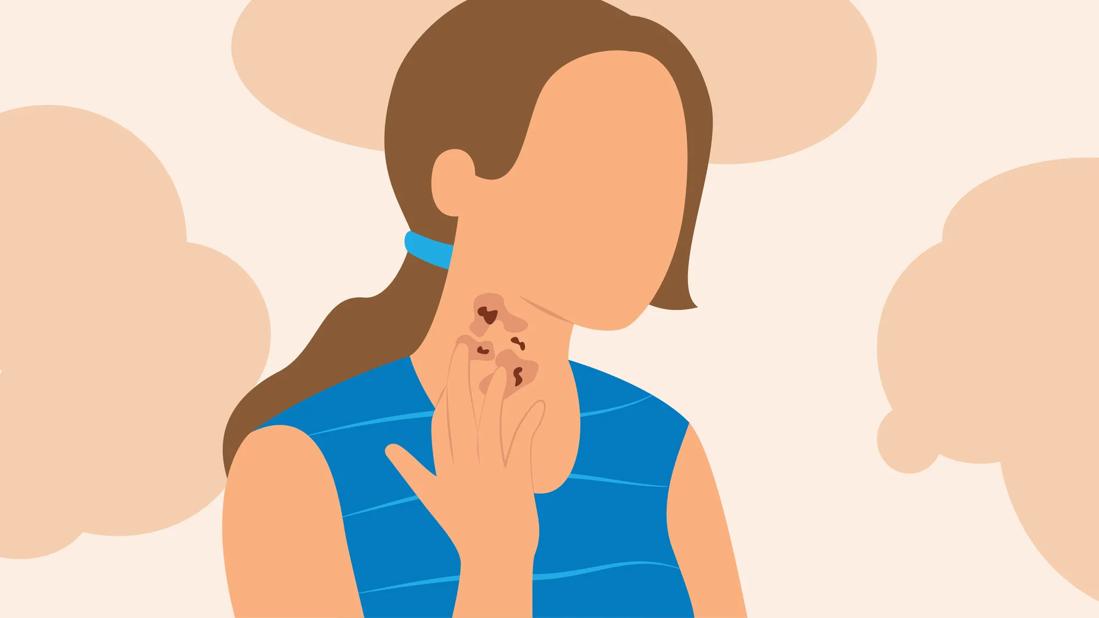Both inflammatory conditions have varying triggers and symptoms

A red, itchy rash can be confusing, especially when it keeps coming back. You may wonder: What’s causing this? Could it be eczema or psoriasis?
Advertisement
Cleveland Clinic is a non-profit academic medical center. Advertising on our site helps support our mission. We do not endorse non-Cleveland Clinic products or services. Policy
They may look similar at first. But there are clear differences between the two conditions.
Dermatologist Anthony Fernandez, MD, PhD, unearths what makes them different and how to manage symptoms.
Video content: This video is available to watch online.
View video online (https://cdnapisec.kaltura.com/p/2207941/sp/220794100/playManifest/entryId/1_6zhcro5r/flavorId/1_5f3sgelj/format/url/protocol/https/a.mp4)
Wondering if that red, scaly patch on your skin is eczema or psoriasis? Learn how to tell the difference.
There are several types of eczema. Most are caused by inflammation from an overactive immune system. The most common type, atopic dermatitis, can flare up when you have an infection or your skin touches an allergen, irritant or product that disrupts your skin barrier.
Psoriasis has several different variations, too. It’s largely an autoimmune condition that causes inflammation and speeds up the process of new skin development. With plaque psoriasis — the most common type — skin cells begin to pile up on top of each other to create thick, swollen, discolored scales or plaques.
“Eczema is a condition with inflammation of the skin that makes your skin sensitive and prone to infection,” Dr. Fernandez explains. “Plaque psoriasis is a long-term condition. It can come and go, but you can manage it with home remedies and medication.”
Eczema and psoriasis are both chronic conditions with no cure. But they affect your skin in different ways. Here’s how to tell them apart.
Psoriasis has thick plaques with sharp edges. These scaly plaques can crack, bleed and feel rough or leathery.
Advertisement
Eczema usually has more poorly defined edges. It may ooze fluid and raise your risk of infection.
“When we see fluid, we usually think about eczema, not psoriasis,” Dr. Fernandez says.
Eczema can appear anywhere, but it often shows up in skin folds. Common areas include:
Psoriasis often affects the outside of your knees and elbows. It can also show up on your:
Both eczema and psoriasis cause a burning, painful itch. But itching is usually worse with eczema.
“Low humidity dries out your skin and makes itching worse,” notes Dr. Fernandez. “Heat and high humidity can trigger sweating, which can also make you itch.”
Triggers for eczema and psoriasis vary by person.
Eczema is often triggered by things outside your body, like:
Psoriasis triggers are more internal and may include:
Despite their differences, eczema and psoriasis have a lot in common:
“Even though the causes of eczema and psoriasis are different, treatment is usually similar,” Dr. Fernandez says. “But biologics that work for one often don’t work for the other.”
There may not be a cure, but you can manage symptoms with these strategies:
It can be hard to tell eczema and psoriasis apart without a diagnosis. If you have a rash that doesn’t go away with over-the-counter medications, see a healthcare provider.
“We look at the full picture — your symptoms, family history and other conditions — to tell the difference,” Dr. Fernandez says. “Sometimes, we can tell just by looking. But in some cases, we need to do a biopsy.”
Advertisement

Sign up for our Health Essentials emails for expert guidance on nutrition, fitness, sleep, skin care and more.
Learn more about our editorial process.
Advertisement

Keeping your skin dry, wearing the right clothes and investing in anti-chafe products can help minimize skin irritation

Working with a therapist, staying active and practicing mindfulness are just a few ways to help manage stress

Laser hair removal, laser surgery, excision and steroid injections are all potential treatment options

Use products that reduce inflammation without causing irritation and avoid fragrances, dyes and exfoliators

Nutrition plays an important role in managing this chronic inflammatory skin disease

Aloe vera, warm compresses and diet adjustments can help alleviate symptoms

Popping or prodding at these cysts could lead to infection

Causes can include dry skin, eczema, psoriasis, sunburn and fungal infections

Even small moments of time outdoors can help reduce stress, boost mood and restore a sense of calm

A correct prescription helps your eyes see clearly — but as natural changes occur, you may need stronger or different eyeglasses

Both are medical emergencies, but they are very distinct events with different causes